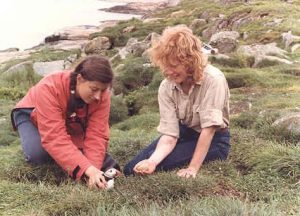Since her time at QLF, Nathalie has consistently valued professional relationships that are critically important for the implementation of ecological and social projects across Québec. “I think that what QLF is so good at is actually working on that interface between the natural environment and people,” she says. “[Especially considering] how we use it, why we use it, how we can better use it, […and how we can] less misuse it.”
QLF Experiences
Instructor, Ocean Horizons Marine Education Program, 1981
Volunteer, International Seabird Conference, Newfoundland, 1982
Intern, Marine Bird Conservation Program, Newfoundland and Québec Lower North Shore, 1983-1984
Staff, QLF-Canada, Montréal office, 1990
QLF Alumni Congress, Barcelona, Catalonia, Spain, 2016
Working as the Executive Director and Secretary-Treasurer for American Friends of Canadian Nature (AFCN), Nathalie Zinger uses her outgoing personality to spread environmental awareness and to connect eco-friendly individuals throughout the United States and Canada. The AFCN is a non-profit organization that strives to raise funds in the United States for conservation work to be done in Canada. Before this opportunity, she worked for over a decade as the Regional Vice President of Québec for the Nature Conservancy of Canada (NCC), preserving nature and biodiversity on lands across Canada for future generations. In both positions, Nathalie has been responsible for securing land, stewarding properties, and ensuring the protection of boreal forest landscapes. “I really enjoy talking to landowners that have a vision or a wish to see their land protected forever, and then to be able to make those dreams come true,” she admits, “I’m always fascinated and very grateful for donors that share that vision of making conservation part of their legacy. It’s a privilege to be able to work with both donors and landowners to make conservation a reality.”

Nathalie Zinger works alongside Dr. Kathleen Blanchard in QLF’s
Marine Bird Conservation Program, St. Mary’s Island Seabird Sanctuary, Quebec North Shore, 1983.
PHOTOGRAPH COURTESY OF QLF ARCHIVES
After completing the third year of her Bachelor’s in Wildlife Management at McGill University in 1981, Nathalie obtained her first job on Fogo Island in Newfoundland and Labrador, teaching kids about the environment as part of the Ocean Horizons Marine Education Program with the Québec-Labrador Foundation (QLF). “It was great, amazing work,” she recalls, “doing something on your own with a team of people that are dedicated, making it happen.” In the summer of the following year, she volunteered to join Kath Blanchard of QLF in attending and co-sponsoring an international conference in St-John’s, Newfoundland, concerning marine seabirds. She then participated in QLF’s Marine Bird Conservation Program, running a bird tour for Bird Protection Québec along the Québec Lower North Shore during the summers of both 1983 and 1984. Afterward, Nathalie completed a graduate diploma in Northern Studies at McGill University, as well as a master’s degree at the University of Montréal’s School of Landscape Planning. Her research addressed how the perception of Mount Royal changed over 150 years, as depicted by the writers, geographers, urban planners, developers, and conservation organizations that have worked to protect the mountain.
In 1990, Nathalie began working for QLF part-time, helping other staff members set up the Montréal Office and create Québec Lower North Shore projects. At the same time, she also worked part-time for the World Wildlife Fund (WWF), switching to full-time status to become the Director of Québec’s Endangered Spaces Program in 1993. Nathalie remembers the highlights of her experience with WWF: “It was working with the forest industry to identify areas of high conservation value and making sure that we increased those protected areas by over ten-fold, […as well as establishing] the first marine park in Québec [called the Saguenay St. Lawrence Marine Park].” She then left the WWF in 2003 to become the General Director of Héritage Montréal for four years before transferring to the NCC, “learning how to manage a Board and be the head of an organization” while working to protect the architectural, natural, historical, and cultural heritage of the Greater Montréal area.

Mount Royal Park, Montréal, site of Nathalie’s research for her
Master’s degree. PHOTOGRAPH COURTESY OF RICH MARTELLO
In her spare time, Nathalie remains both culturally and environmentally active in the Montréal community through volunteer work with several other NGOs. For instance, she is the President of the Administrative Council for Économusée, which is a non-profit organization that aims to help artisans with small businesses continue their traditional crafts through tourism promotion and demonstrative production on an international scale. Nathalie is also a member of McGill University’s Advisory Board for the Faculty of Agriculture and Environmental Science. In addition, she is a Governor of Les Amis de la Montagne, which is another non-profit organization that uses community involvement, stewardship, advocacy, and environmental education to encourage sustainability regarding Montréal’s Mount Royal. Essentially, Nathalie is always more than willing to dedicate her passion toward a broad range of worthy causes.
Nathalie’s generous spirit and resourceful determination exemplify QLF’s mission to foster leadership and encourage collaboration in all alumni. She recognizes that working for an NGO is all about being part of an effective team to create a reliable network and to construct a unified vision. “You realize that you may have a great idea, but unless you have people around you to make it happen – it doesn’t happen very easy otherwise,” she explains. “So that’s what QLF provides you, […the] sense of like, ‘together you can make it happen’.” Since her time at QLF, Nathalie has consistently valued the strength of the human connection, building long-lasting relationships with many people throughout her career to successfully implement numerous ecological and social projects across Québec. “I think that what QLF is so good at is actually working on that interface between the natural environment and people,” she says. “[Especially considering] how we use it, why we use it, how we can better use it, […and how we can] less misuse it.” Nathalie is an inspiring example of professional growth in the environmental non-profit industry, as she continues to help make positive local change possible well into the future.






